Augustus, born Octavian, transformed Rome from a republic to an empire and ushered in an era of unprecedented peace and prosperity known as the Pax Romana. As the first Roman emperor, he consolidated power through political maneuvering and military victories, expanding Rome’s territory to encompass the Mediterranean world. Augustus instituted sweeping reforms that stabilized the empire’s governance and economy, leaving an indelible mark on Roman society and culture that would endure for centuries.
The fall of the Roman Republic
The fall of the Roman Republic marked a pivotal moment in ancient history, transforming the political landscape of Rome and paving the way for the rise of the Roman Empire. This period of turmoil and change saw the erosion of republican institutions and the concentration of power in the hands of influential military leaders. The collapse of the centuries-old republican system ultimately led to the emergence of Augustus as Rome’s first emperor, ushering in a new era of imperial rule that would shape the Mediterranean world for centuries to come.
Rise of Octavian (later Augustus)
The rise of Octavian, later known as Augustus, marked a pivotal moment in Roman history. Following Julius Caesar’s assassination in 44 BCE, Octavian emerged as a key figure in the power struggle that ensued. Through political maneuvering and military victories, he gradually consolidated his authority, ultimately becoming Rome’s first emperor in 27 BCE . This transition from Republic to Empire ushered in the Pax Romana, a period of relative stability and prosperity that would define Rome for centuries to come.
Thesis: Augustus’ transformation of Rome from Republic to Empire
Augustus Caesar’s transformation of Rome from Republic to Empire marked a pivotal moment in ancient history. His ascension to power in 27 BCE ushered in a new era of Roman dominance, reshaping political structures and expanding territorial control across the Mediterranean. Under Augustus’ rule, Rome evolved from an oligarchic system into a centralized imperial power that would endure for centuries.
Early Life and Rise to Power
Augustus, born Gaius Octavius in 63 BCE, emerged from humble beginnings to become the first Roman emperor and architect of the Pax Romana. His ascent to power came through a combination of political savvy, military victories, and strategic alliances that transformed the Roman Republic into an empire . Augustus’s reign ushered in an era of unprecedented peace and prosperity, marking a pivotal shift in Roman history.
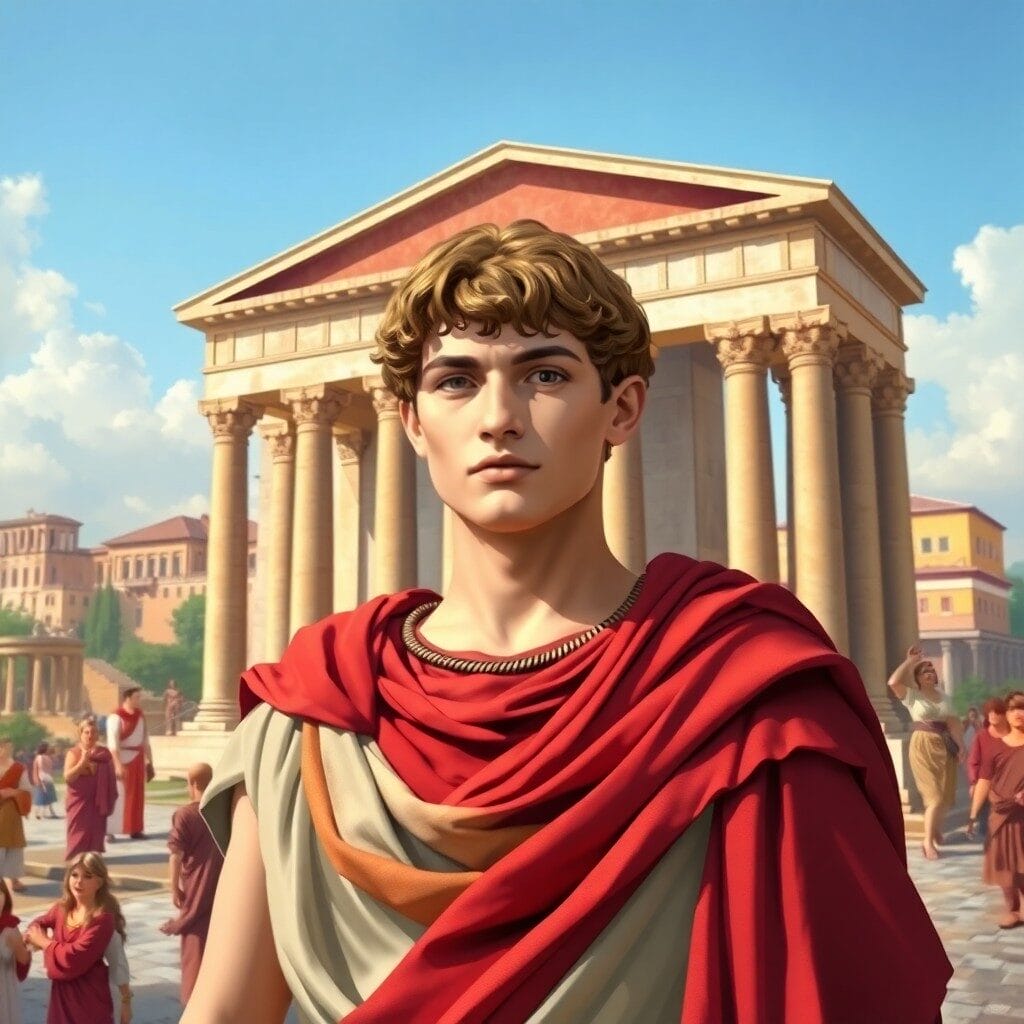
Family background and education
Augustus, born Gaius Octavius, came from a wealthy equestrian family in the town of Velitrae. His father, also named Gaius Octavius, was the first in the family to become a senator and served as governor of Macedonia. Augustus’ mother, Atia, was Julius Caesar’s niece, connecting him to one of Rome’s most prominent families. As a youth, Augustus received an extensive education befitting his social status, studying Greek and Latin literature, rhetoric, and philosophy under renowned tutors. This educational foundation prepared him well for his future role in Roman politics and laid the groundwork for his literary patronage as emperor. Augustus’ early exposure to both Roman traditions and Hellenistic culture would significantly influence his later policies and cultural initiatives as he transformed Rome from a republic into an empire.
Relationship with Julius Caesar
Augustus’ relationship with Julius Caesar was pivotal in shaping his rise to power and eventual transformation of the Roman Republic into an empire. As Caesar’s adopted son and heir, Augustus leveraged his connection to the revered general to gain support from the army and common people . Following Caesar’s assassination in 44 BCE, Augustus skillfully navigated the ensuing power struggle, ultimately emerging victorious and establishing himself as Rome’s first emperor in 27 BCE . Augustus drew inspiration from Caesar’s military and political strategies while also learning from his mistakes, carefully cultivating an image of moderation to avoid Caesar’s fate.
The Second Triumvirate
The Second Triumvirate marked a pivotal period in Roman history, formed in 43 BCE by Octavian (later Augustus), Mark Antony, and Marcus Aemilius Lepidus. This political alliance aimed to consolidate power and avenge Julius Caesar’s assassination. The triumvirs divided the Roman territories among themselves, with Octavian controlling the West, Antony the East, and Lepidus governing Africa. Their rule was characterized by proscriptions against political opponents and the defeat of Caesar’s assassins at the Battle of Philippi in 42 BCE. However, tensions soon arose within the triumvirate, leading to Lepidus’s marginalization and eventual conflict between Octavian and Antony. This power struggle culminated in the Battle of Actium in 31 BCE, where Octavian emerged victorious, paving the way for his transformation of the Roman Republic into the Roman Empire.
Defeat of Mark Antony and Cleopatra
The defeat of Mark Antony and Cleopatra marked a pivotal moment in Roman history, solidifying Octavian’s (later Augustus) rise to power. After years of civil war and political maneuvering, the final showdown took place at the Battle of Actium in 31 BCE, where Octavian’s forces decisively defeated the combined fleets of Antony and Cleopatra. This victory effectively ended the Roman Republic and paved the way for the establishment of the Roman Empire under Augustus. The aftermath saw Antony and Cleopatra flee to Egypt, where they both ultimately committed suicide rather than face capture and humiliation. Octavian’s triumph over his rivals allowed him to portray himself as the heir to Alexander the Great and a truly global ruler, with Romans viewing their civil war in global terms . The defeat of Antony and Cleopatra also had far-reaching consequences for Rome’s control over the eastern Mediterranean, consolidating its dominance and setting the stage for the Pax Romana that would define Augustus’ reign.
The Transition from Republic to Empire
The transformation of Rome from Republic to Empire marked a pivotal shift in ancient history. Under Augustus, the first emperor, Rome evolved from a city-state into the center of a vast Mediterranean empire . This transition brought profound changes to Roman governance, society, and culture, ushering in the era known as the Pax Romana.
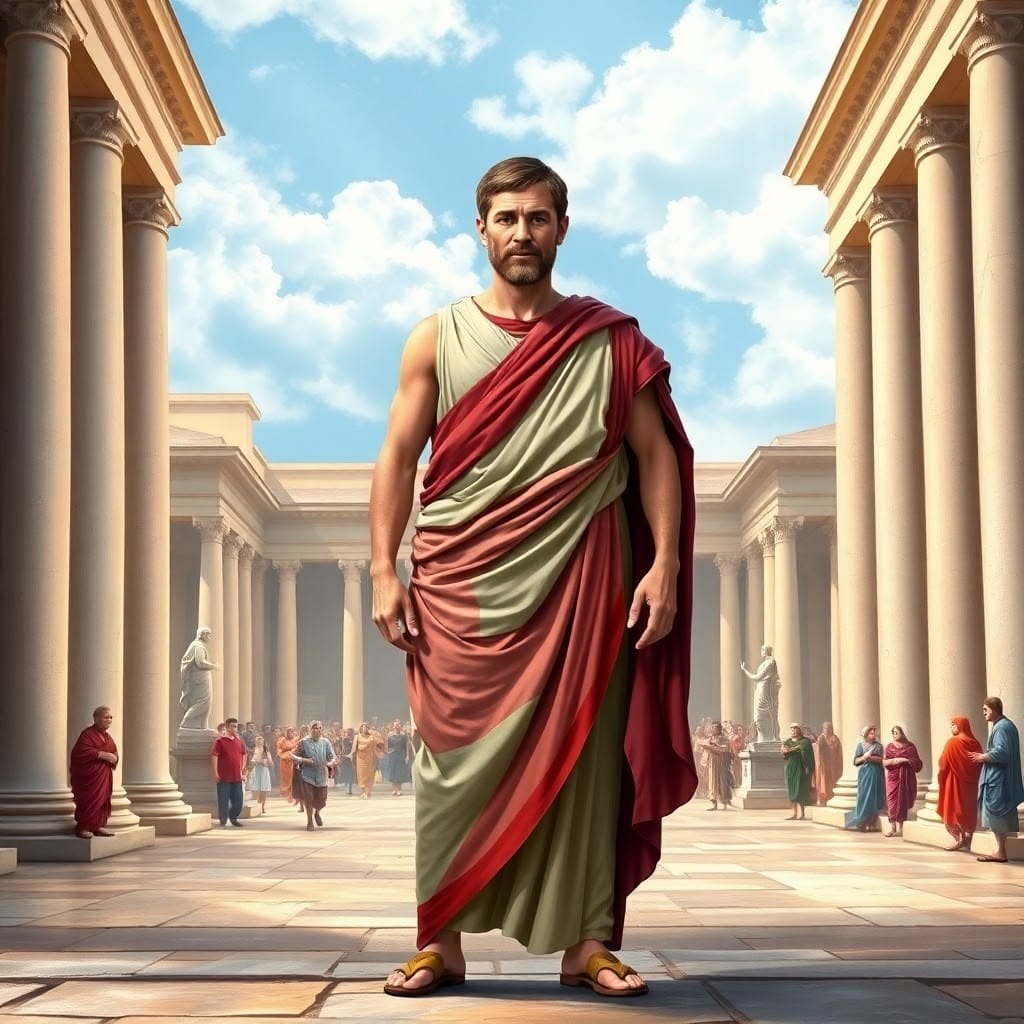
Constitutional reforms
Retention of Republican institutions
Augustus, in his role as the first Roman emperor, carefully maintained many Republican institutions to provide a veneer of continuity with the past. He preserved the Senate, consuls, and other traditional offices, though their actual power was diminished. The emperor also kept up the practice of holding elections, even if the results were largely predetermined. By retaining these familiar structures, Augustus aimed to ease the transition from Republic to Empire and legitimize his new regime. However, real authority now rested with Augustus himself and his imperial bureaucracy, which gradually expanded to administer the vast territories under Roman control . This strategic retention of Republican forms, combined with actual centralization of power, became a hallmark of the Augustan system that would endure for centuries.
Concentration of power in Augustus’ hands
Augustus systematically consolidated power in his own hands, transforming the Roman Republic into an imperial system. He assumed key political and religious offices, gaining control over the military, finances, and provincial administration . Through careful maneuvering, Augustus established himself as the undisputed ruler while maintaining a façade of republican institutions. His reign marked a pivotal shift, as he reconfigured Rome’s political structure from an oligarchic regime to a monarchical dictatorship, though earlier republican elements continued to function in altered forms.
The title of ‘Augustus’ and its significance
The title of ‘Augustus’ held profound significance in ancient Rome. Bestowed upon Octavian by the Senate in 27 BCE, it elevated him to a status above ordinary citizens and marked the beginning of his role as the first Roman emperor. The term ‘Augustus’ carried religious connotations, implying divine favor and authority. This honorific title became synonymous with imperial power and was adopted by subsequent Roman emperors, solidifying its importance in Roman political and cultural spheres.
Creation of the Principate
The creation of the Principate marked a pivotal transformation in Roman governance, as Augustus skillfully reshaped the Republic into an imperial system while maintaining a facade of traditional institutions. This new political structure, centered around the princeps as the “first citizen,” allowed Augustus to consolidate power through a complex network of legal, military, and social reforms . Augustus leveraged clementia (mercy) as a key virtue to justify his authority and establish the foundations of the Pax Romana, effectively balancing autocratic control with a veneer of republican ideals . The Principate proved instrumental in stabilizing the Roman state and preserving the empire, though it ultimately sowed the seeds for future crises, including the tumultuous “third century Crisis”.
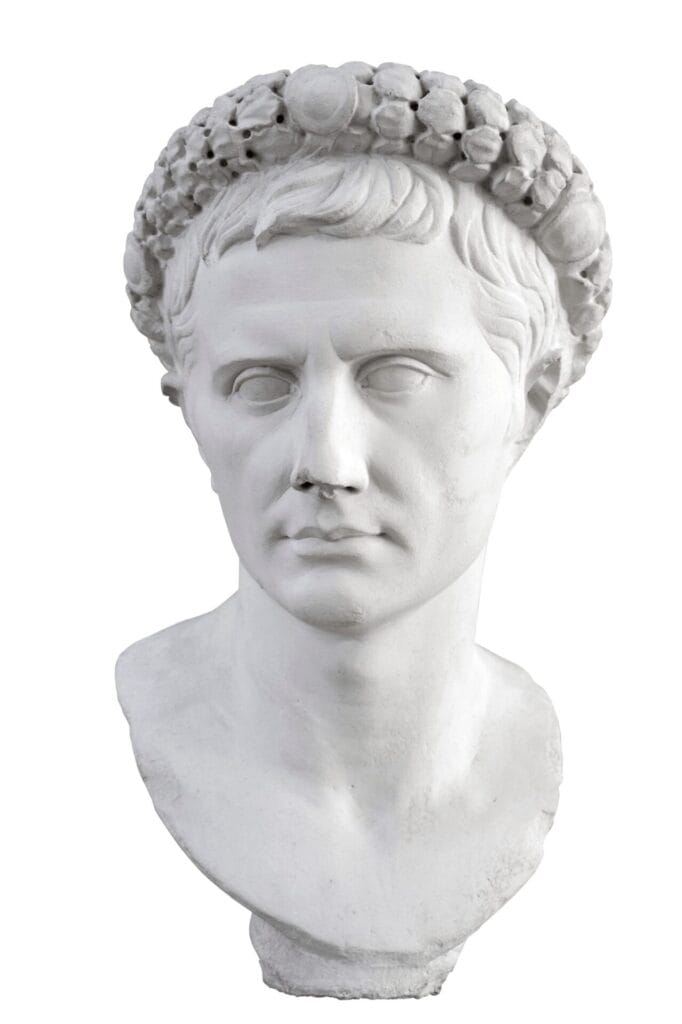
Political Reforms and Innovations
Augustus, the first Roman emperor, implemented sweeping political reforms that transformed the Roman Republic into the Roman Empire. His innovative approach to governance reshaped Rome’s institutions and laid the foundation for centuries of imperial rule. Augustus centralized power while maintaining a facade of republican traditions, creating a new political system known as the Principate.
Reorganization of the Roman administration
Augustus implemented sweeping changes to the Roman administrative system as part of his transformation of the Republic into the Empire. He established new provincial governorships, reorganized tax collection, created the Praetorian Guard, and instituted reforms to professionalize the civil service. These administrative reforms centralized power in the hands of the emperor while maintaining the facade of Republican institutions.
Reform of the Roman Senate
Augustus implemented significant reforms to the Roman Senate as part of his broader efforts to consolidate power and reshape the Roman state. He reduced the Senate’s size from around 1,000 to 600 members and established stricter property qualifications for membership. Augustus also created new senatorial ranks and privileges, tying senators more closely to imperial patronage. These changes diminished the Senate’s political influence while maintaining its prestige, helping Augustus transition Rome from a republic to an empire under his control.
Establishment of the Praetorian Guard
Augustus Caesar established the Praetorian Guard as an elite military unit to serve as his personal bodyguard and maintain order in Rome. This force of around 9,000 soldiers was stationed in and around the city, wielding significant political influence due to their proximity to the emperor. The Praetorian Guard’s creation marked a key shift from Republican traditions, centralizing power around the emperor and contributing to the new imperial system of governance.
Creation of a professional civil service
Augustus established a professional civil service to effectively manage the vast Roman Empire. He created a structured bureaucracy with defined roles and responsibilities, recruiting capable individuals from various social classes to serve in administrative positions. This system helped standardize governance across the empire and ensured more efficient implementation of imperial policies.
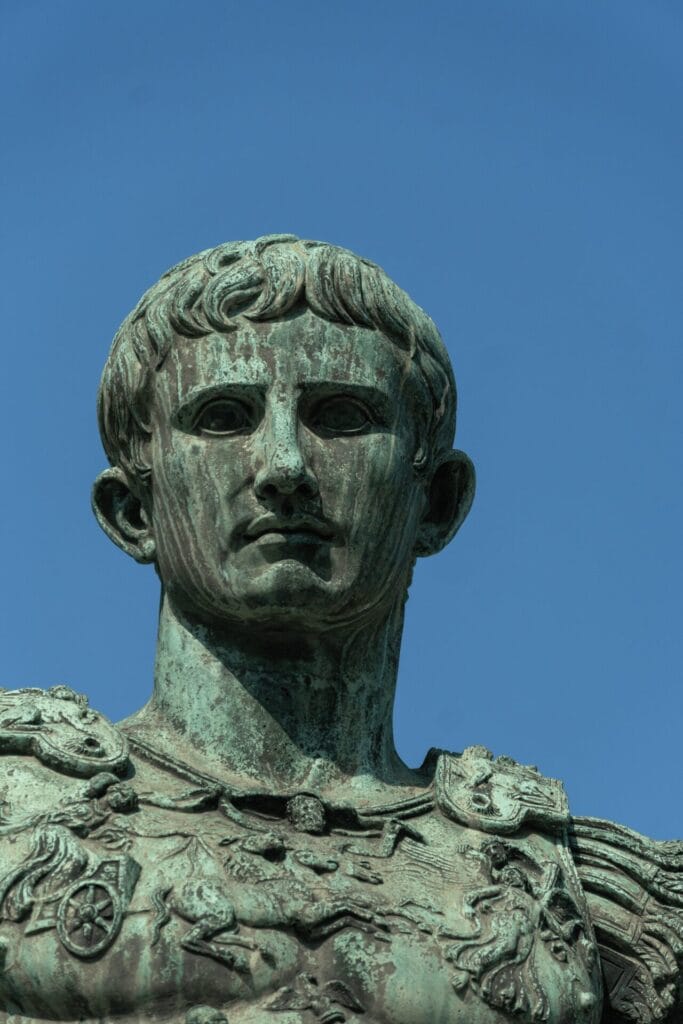
Military Conquests and Expansions
Augustus Caesar, the first Roman emperor, oversaw a period of unprecedented territorial expansion that transformed Rome from a republic into a vast empire. Under his rule, Roman legions pushed the empire’s borders outward, incorporating new lands and peoples across Europe, North Africa, and the Near East . This era of conquest laid the foundation for the Pax Romana, a time of relative peace and stability that would define Roman dominance for centuries to come.
Consolidation of existing territories
Augustus focused on solidifying Rome’s control over its existing territories during his reign. He implemented administrative reforms to improve governance and tax collection across the empire. Augustus also strengthened frontier defenses, establishing permanent legionary camps along borders to deter invasions. Additionally, he invested in infrastructure projects like roads and aqueducts to better integrate far-flung provinces with Rome. These efforts helped consolidate Roman power and create more stable, unified rule over the vast territories conquered during the late Republic.
Expansion into new regions
Augustus, the first Roman emperor, oversaw a period of significant territorial expansion that transformed Rome from a republic into a vast empire. Under his rule, Roman influence extended to new regions across the Mediterranean and beyond, laying the foundations for centuries of Roman dominance. This expansion brought Rome into contact with diverse cultures and peoples, reshaping the demographic and cultural landscape of the empire.
Gaul and Germania
Augustus Caesar’s expansion into Gaul and Germania marked a significant phase in Rome’s territorial growth. The conquest of Gaul under Julius Caesar was consolidated, while attempts to subdue Germanic tribes met with mixed success. These campaigns extended Roman influence deep into central Europe, bringing new peoples and resources under imperial control. However, the defeat of Roman legions in the Teutoburg Forest in 9 CE halted further eastward expansion, establishing the Rhine as a de facto frontier of the empire.
Hispania
Augustus implemented significant changes in Hispania, dividing the region into three provinces: Baetica, Lusitania, and Hispania Citerior Tarraconensis. This reorganization included the creation of new road networks to connect newly founded cities and bring Roman administration to the northwestern Iberian Peninsula . The restructuring also involved establishing permanent legionary camps in northern Hispania, forming a protective barrier south of the Cantabrian mountain range.
Egypt and the East
Augustus’s expansion of the Roman Empire into Egypt and the eastern Mediterranean had profound effects on Rome’s demographics and culture. The Imperial period saw a substantial shift in the genetic makeup of the Roman population, with increased ancestry from eastern Mediterranean and Near Eastern populations . This genetic influx corresponded with cultural changes, as evidenced by the prevalence of Greek inscriptions, eastern religious practices, and immigrants from the east settling in Rome . Interestingly, despite Rome’s conquests in the western provinces, genetic evidence suggests relatively limited immigration from those regions during this time.
Military reforms and the standing army
Augustus implemented sweeping military reforms that transformed the Roman army into a professional standing force. He established a permanent, salaried army of around 28 legions totaling about 170,000 men. These reforms included standardizing equipment, training, and tactics across the legions. Augustus also created the Praetorian Guard as his personal bodyguard unit and instituted a 16-year minimum service requirement for legionaries. These changes professionalized the army and increased its loyalty to the emperor rather than individual generals.

The Pax Romana
The Pax Romana, or “Roman Peace,” marked a pivotal era in ancient Roman history. This period of relative stability and prosperity began with Augustus’s reign and lasted for about two centuries. During this time, the Roman Empire reached its territorial zenith, encompassing vast regions around the Mediterranean . The Pax Romana facilitated unprecedented cultural exchange and development across the empire, leaving an enduring legacy in fields such as literature, law, and governance.
Definition and significance
Augustus, the first Roman emperor, transformed the Roman Republic into the Roman Empire, ushering in an era known as the Pax Romana. This period of relative peace and stability lasted for about two centuries, allowing Roman culture to flourish and expand its influence across the Mediterranean world . Augustus implemented significant reforms, including changes to the tax system and the introduction of new imposts like the vicesima hereditatum (inheritance tax) and capitatio terrena (land tax), which helped finance the empire’s growth and administration.
Economic prosperity and stability
Augustus’s reign ushered in an era of economic prosperity and stability for the Roman Empire. Under his leadership, trade flourished across the Mediterranean, bolstered by the Pax Romana and improved infrastructure. Agricultural production increased, and new industries emerged, contributing to rising living standards for many Romans. The emperor’s fiscal reforms, including the establishment of a more efficient tax system and a stable currency, further strengthened the empire’s economic foundations.
Infrastructure development
Augustus recognized the importance of infrastructure in unifying and modernizing the Roman Empire. During his reign, he initiated extensive public works projects, including the construction and improvement of roads, aqueducts, and public buildings throughout Rome and its territories . These infrastructure developments facilitated trade, communication, and military movement across the vast empire, while also serving as a visible symbol of Roman power and engineering prowess.
Cultural flourishing
The reign of Augustus ushered in a golden age of Roman culture and artistic achievement. Literature flourished with poets like Virgil and Horace producing masterpieces that are still studied today . Architecture and engineering reached new heights, as seen in the construction of magnificent public buildings and infrastructure projects across the empire. The visual arts also thrived, with sculpture and painting reflecting both Roman and Hellenistic influences. This cultural renaissance helped solidify Rome’s status as the dominant Mediterranean power and spread Roman civilization throughout the conquered territories.
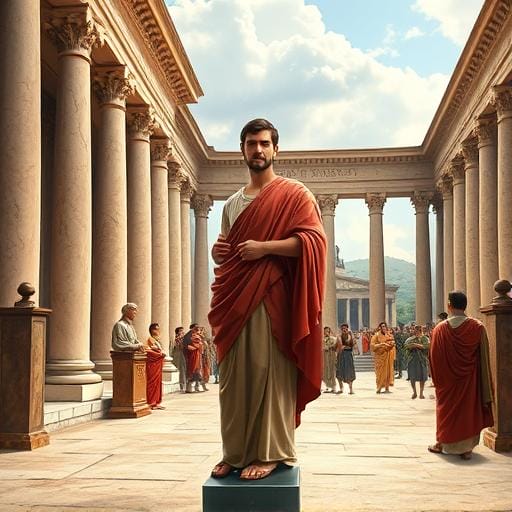
Social and Cultural Impact
Augustus’s reign as the first Roman emperor ushered in profound social and cultural changes that reshaped Roman society. The transition from Republic to Empire under his rule brought about a period of relative peace and stability known as the Pax Romana. This era saw significant developments in art, literature, architecture, and social norms that would define Roman culture for centuries to come . Augustus’s cultural policies promoted traditional Roman values while also embracing elements of Hellenistic culture, creating a unique blend that characterized Imperial Roman society.
Moral and religious reforms
Augustus implemented significant moral and religious reforms during his reign as emperor. He sought to revive traditional Roman values and religious practices, establishing laws to promote marriage and childbearing among the upper classes. Augustus also restored numerous temples and revived ancient priesthoods, positioning himself as the chief priest of Roman state religion. These reforms aimed to strengthen social order and solidify Augustus’ authority as the empire transitioned from republic to principate.
Patronage of the arts and literature
Augustus recognized the power of art and literature to shape public opinion and promote his vision for Rome. He patronized poets like Virgil and Horace, who celebrated Roman values and Augustus’ achievements in their works. The emperor also embarked on an ambitious building program, transforming Rome with grand marble structures that showcased the empire’s wealth and glory. This cultural flourishing under Augustus’ patronage helped solidify his rule and create an enduring legacy of Roman art and literature.
Architectural achievements
Augustus transformed Rome’s architectural landscape during his reign, ushering in an era of monumental building projects that reflected the empire’s power and prosperity. He famously boasted that he “found Rome a city of bricks and left it a city of marble,” overseeing the construction of impressive structures like the Temple of Apollo Palatinus, the Forum of Augustus, and the Altar of Augustan Peace . These grand edifices not only beautified the capital but also served to legitimize Augustus’ rule and promote his vision of Roman greatness. The architectural achievements of Augustus laid the foundation for the cultural flowering that would characterize the Pax Romana period.
The Augustan Age in Roman culture
The Augustan Age marked a golden era in Roman culture, characterized by a flourishing of literature, art, and architecture. During this period, Rome experienced a cultural renaissance that produced enduring works in poetry, history, and philosophy . Augustus patronized artists and writers, leading to the creation of masterpieces like Virgil’s Aeneid and Horace’s Odes, which celebrated Roman values and the emperor’s achievements.
Foreign Policy and Diplomacy
Augustus Caesar’s foreign policy and diplomatic efforts were instrumental in transforming Rome from a republic to a vast empire encompassing the Mediterranean. As the first Roman emperor, Augustus skillfully balanced military might with strategic alliances to expand and secure Roman territories . His diplomatic settlement with Parthia around 20 BCE laid the groundwork for a period of relative stability along Rome’s eastern frontier, though tensions persisted beneath the surface.
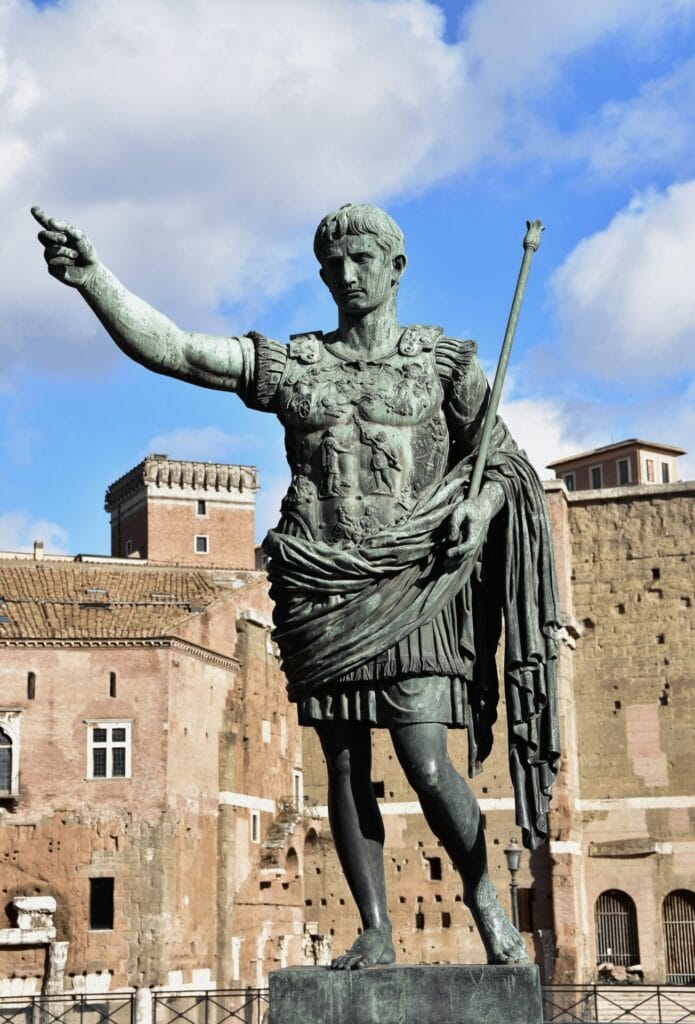
Relations with neighboring kingdoms
Augustus skillfully managed relations with neighboring kingdoms to expand and secure Rome’s borders. He used a combination of diplomacy, military force, and strategic alliances to bring stability to frontier regions. Augustus annexed Egypt as a province, made client states of Armenia and Judaea, and reached a settlement with Parthia that returned Roman military standards captured decades earlier . These efforts laid the groundwork for the Pax Romana period of relative peace and prosperity across the Mediterranean world.
Client states and buffer zones
Augustus strategically employed client states and buffer zones to expand and secure Roman influence beyond the empire’s formal boundaries. These semi-autonomous regions served as a protective barrier against external threats while allowing Rome to exert control indirectly. By establishing alliances with local rulers and providing military support when needed, Augustus extended Roman power without the full cost and commitment of direct rule. This approach helped stabilize frontier regions and facilitated gradual integration of new territories into the empire over time.
Trade and economic ties
Augustus’s reign ushered in an era of expanded trade and economic connections across the Roman Empire. The Pax Romana facilitated commerce through improved infrastructure, standardized currency, and relative stability . Rome engaged in long-distance trade with regions beyond its borders, including northern Europe, sub-Saharan Africa, India, and Asia . This economic integration helped bind together the diverse territories and peoples under Roman rule, contributing to the empire’s longevity and cultural influence.
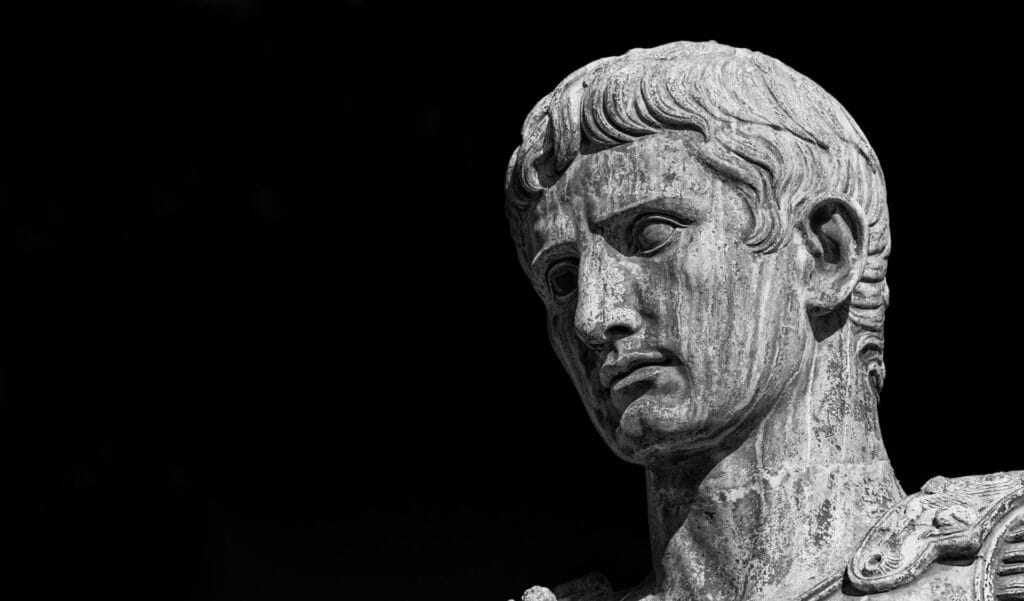
The Succession Question
The succession question loomed large over Augustus’s reign as he sought to establish a stable imperial system. As the first Roman emperor, Augustus faced the challenge of determining how power would be transferred after his death. This issue was critical for maintaining the Pax Romana and avoiding a return to civil war. Augustus experimented with various potential heirs and succession arrangements throughout his long rule.
Augustus’ attempts to secure a successor
Augustus made several attempts to secure a successor for his imperial rule. He initially favored his nephew Marcellus, but after Marcellus’ untimely death, Augustus turned to his close friend and general Marcus Agrippa. Augustus adopted Agrippa’s sons Gaius and Lucius as his own heirs, but both died young. Eventually, Augustus settled on his stepson Tiberius as his successor, adopting him and naming him co-ruler in his final years.
The role of the Julio-Claudian dynasty
The Julio-Claudian dynasty, founded by Augustus, played a pivotal role in shaping the Roman Empire during its early years. This imperial family established many of the precedents and institutions that would define Roman rule for centuries to come. Under the Julio-Claudians, Rome expanded its territory and influence across the Mediterranean, though their methods of maintaining control over the eastern frontier were sometimes viewed critically by Roman historians.
Long-term implications for imperial succession
Augustus’s establishment of imperial succession had far-reaching consequences for the Roman Empire. His system of adopting heirs and designating successors created a precedent that shaped imperial politics for centuries. This approach aimed to ensure stability and continuity of rule, but it also led to power struggles and conflicts over succession that would plague later emperors.
Legacy and Historical Significance
Augustus, the first Roman emperor, transformed the Roman Republic into the Roman Empire and ushered in an era known as the Pax Romana. His reign marked a pivotal shift in Roman history, establishing a new system of governance that would endure for centuries. Augustus’s legacy as the architect of empire continues to fascinate historians and scholars, who study his political acumen, military conquests, and cultural achievements that laid the foundation for Rome’s golden age.

Augustus’ lasting impact on Roman governance
Augustus’ reforms to Roman governance had far-reaching effects that shaped the empire for centuries. He centralized power under the principate while maintaining a facade of republican institutions. Augustus established new administrative systems, reorganized the provinces, and created the Praetorian Guard. His reign ushered in the Pax Romana, a long period of relative peace and stability across the Mediterranean world . These changes laid the foundation for imperial rule and allowed Rome to effectively govern its vast territories for generations to come.
The model for future emperors
Augustus established a model of imperial leadership that would be emulated by future Roman emperors for centuries. His reign marked the transition from republic to empire, instituting reforms that centralized power while maintaining the facade of traditional republican institutions. Augustus’s approach to governance, combining authoritarian control with public image management, became the template for imperial rule during the Pax Romana era . His cultural and administrative policies shaped Roman society profoundly, influencing fields from literature and art to law and provincial administration.
Influence on Western civilization
Augustus’s reign as the first Roman emperor ushered in the Pax Romana, a period of relative peace and stability that had far-reaching effects on Western civilization. His political and cultural reforms laid the foundation for an empire that would shape law, governance, art, and philosophy across Europe and beyond for centuries . The Augustan model of imperial rule and the concept of a unified Mediterranean world under Roman dominion continued to influence European political thought long after the fall of Rome itself.
Conclusion
Augustus transformed Rome from a republic into an empire, ushering in the Pax Romana era of relative peace and stability. His reign marked a pivotal shift in Roman governance, culture, and territorial expansion . The legacy of Augustus and the imperial system he established would shape the Mediterranean world for centuries to come, leaving an indelible mark on Western civilization.
Recap of Augustus’ major achievements
Augustus Caesar’s reign marked a pivotal transformation of Rome from republic to empire. He consolidated power through constitutional reforms, expanded Roman territory, and ushered in an era of relative peace and prosperity known as the Pax Romana . Augustus oversaw major public works projects that reshaped Rome’s urban landscape. His cultural patronage spurred a golden age of Latin literature and art that defined Roman aesthetics for centuries . By establishing a stable imperial system and expanding Roman influence across the Mediterranean world, Augustus laid the foundations for Rome’s dominance as a superpower in antiquity.
The transformation of Rome under his rule
Under his leadership, Rome experienced profound changes in governance, infrastructure, and culture that laid the foundation for centuries of imperial rule. The Pax Romana ushered in by Augustus brought stability and prosperity, solidifying Rome’s position as the dominant Mediterranean power and shaping the course of Western civilization.
Augustus’ place in history as the first Roman Emperor
Augustus’ establishment as the first Roman emperor marked a pivotal shift from republic to empire, ushering in the Pax Romana era of relative peace and stability. His reign laid the foundation for imperial rule that would shape Rome’s governance and expansion for centuries to come . Through skillful political maneuvering and constitutional reforms, Augustus transformed the oligarchic republican system into a de facto monarchy while maintaining the facade of traditional institutions.

